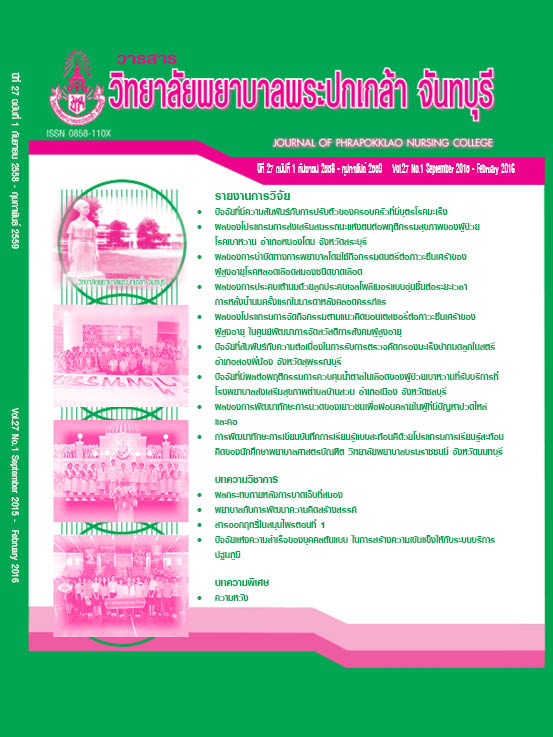The Effects of Self-efficacy Enhancement Program on Health Behaviors among Patients with Diabetes in Nong-Done District, Saraburi Province
Keywords:
Self-efficacy, Health behaviors, Patients with diabetesAbstract
This research is a quasi-experimental research. The purpose of this study was to examine the effects of self-efficacy enhancement program on health behaviors among patients with diabetes. 30 diabetic patients who lived in Nong-Done District, Saraburi Province were recruited based on specific inclusion criteria and equally devided into an experimental group and a control group. The research instruments included 1) the self-efficacy enhancement program developed by the researchers based on Bandura’s Self-efficacy Theory; 2) a manual book of diabetes care; 3) a demographic data questionnaire; 4) a self-efficacy interviewing questionnaire with the reliability of .88; and 5) a health behaviors interviewing questionnaire with the reliability of .75. The experimental group was required to participate in the self-efficacy enhancement program; whereas, the control group received a normal caring. Program implementation and data collection were conducted from November 2013 to January 2014. Data were analyzed using frequency, percentage, mean, standard deviation, paired t-test, and independent t-test.
The research findings revealed that 1) for the experimental group, after the experiment, mean scores of health behavior were statistically significantly higher than those before the experiment (t = 22.760, p < .001); 2) for the control group, after the experiment, mean scores of health behavior were not statistically significantly different from those before the experiment; and 3) after the experiment, mean scores of health behavior of the experimental group were statistically significantly higher than those of the control group (t = 8.028, p < .001).
This study suggested that the program should be promoted among patients with diabetes both in a clinical and community areas, in order to change their lifestyle and health behaviors. Moreover, nurse instructors should draw the results from this study to their students when teaching about chronic disease care.
References
กรมควบคุมโรค กระทรวงสาธารณสุข. (2546). คู่มือการดูแลตนเองเบื้องต้น เรื่องเบาหวาน “รู้ทัน เบาหวาน” สำหรับผู้ที่เป็นเบาหวาน. กรุงเทพฯ: โรงพิมพ์องค์การสงเคราะห์ทหารผ่านศึก.
กลุ่มงานพัฒนายุทธศาสตร์สาธารณสุข สำนักงานสาธารณสุขจังหวัดสระบุรี. (2556). สรุปรายงานการป่วยและรายงานการให้บริการรักษาพยาบาล พ.ศ. 2556. สระบุรี: สำนักงานสาธารณสุขจังหวัดสระบุรี.
กัมมันต์ พันธุมจินดา. (2549). โรคระบบประสาทในผู้ป่วยเบาหวาน. ใน ธิติ สนับบุญ, และวราภณ วงค์ถาวราวัฒน์. (บ.ก.). การดูแลรักษาเบาหวานแบบองค์รวม: Holistic care. หน้า 182-192. กรุงเทพฯ: โรงพิมพ์จุฬาลงกรณ์แห่งมหาวิทยาลัย.
ทิพย์ศุภางค์ สุวรรณศร. (2550). ผลของโปรแกรมการส่งเสริมสมรรถนะแห่งตนต่อพฤติกรรมสุขภาพของผู้ที่เป็นโรคเบาหวาน โรงพยาบาลห้างฉัตร จังหวัดลำปาง (การค้นคว้าอิสระปริญญามหาบัณฑิต). มหาวิทยาลัยเชียงใหม่.
เทพ หิมะทองคำ, วัลลา ตันตโยทัย, พงศ์อมร บุญนาค, ชัยชาญ ดีโรจนวงศ์, และสุนทรี นาคะเสถียร. (2547). การทบทวนองค์ความรู้เบาหวานและน้ำตาลในเลือดสูง. กรุงเทพฯ: โรงพิมพ์องค์การสงเคราะห์ทหารผ่านศึก.
ประศาสน์ ลักษณะพุกก์. (2549). โรคแทรกซ้อนทางตาในผู้ป่วยเบาหวาน. ใน ธิติ สนับบุญ, และวราภณ วงค์ถาวราวัฒน์. (บ.ก.). การดูแลรักษาเบาหวานแบบองค์รวม: Holistic care. หน้า 158-161. กรุงเทพฯ: โรงพิมพ์จุฬาลงกรณ์แห่งมหาวิทยาลัย.
พรนภา ไชยอาสา. (2550). ผลของโปรแกรมการส่งเสริมสมรรถนะแห่งตนและการสนับสนุนทางสังคมต่อพฤติกรรมการบริโภคอาหารในผู้สูงอายุที่เป็นเบาหวาน (วิทยานิพนธ์ปริญญามหาบัณฑิต). มหาวิทยาลัยเชียงใหม่.
พัฒน์พงษ์ นาวีเจริญ. (2549). การเกิดแผลติดเชื้อเรื้อรังในเท้าของผู้ป่วยเบาหวาน. ใน ธิติ สนับบุญ, และวราภณ วงค์ถาวราวัฒน์. (บ.ก.). การดูแลรักษาเบาหวานแบบองค์รวม: Holistic care. หน้า 218-221. กรุงเทพฯ: โรงพิมพ์จุฬาลงกรณ์แห่งมหาวิทยาลัย.
พิมผกา ปัญโญใหญ่. (2550). ผลของโปรแกรมการส่งเสริมสมรรถนะแห่งตนและการสนับสนุนทางสังคมต่อพฤติกรรมการออกกำลังกายของผู้สูงอายุที่เป็นโรคเบาหวาน (วิทยานิพนธ์ปริญญามหาบัณฑิต). มหาวิทยาลัยเชียงใหม่.
วิทยา ศรีดามา. (2549). การควบคุมอาหารในผู้ป่วยโรคเบาหวาน. ใน ธิติ สนับบุญ, และวราภณ วงศ์ถาวราวัฒน์. (บ.ก.). การดูแลรักษาโรคเบาหวานแบบองค์รวม: Holistic care. หน้า 64-69. กรุงเทพฯ: โรงพิมพ์แห่งจุฬาลงกรณ์มหาวิทยาลัย.
สุวิทย์ วิบุลผลประเสริฐ. (2548). ภาพรวมระบบยาของประเทศไทย. กรุงเทพฯ: สำนักงานคณะกรรมการอาหารและยา กระทรวงสาธารณสุข.
สำนักนโยบายและยุทธศาสตร์ กระทรวงสาธารณสุข. (2556). สรุปสถิติสาธารณสุขที่สำคัญ พ.ศ. 2551-2555. กรุงเทพฯ: โรงพิมพ์องค์การสงเคราะห์ทหารผ่านศึก.
American Diabetes Association. (2005). Third-party reimbursement for diabetes care, self-management education and supplies. Diabetes Care, 28, s62-s63.
American Diabetes Association. (2007). Standards of medical care in diabetes. Diabetes Care, 30, s4-s41.
Bandura, A. (1997). Self-efficacy: The exercise of control. New York: Freeman and Company.
Polit, D. F., & Hungler, B. P. (1999). Nursing research: Principle and methods. Philadelphia: Lippincott.
World Health Organization. (2014). 10 facts about diabetes. Retrieved November 3, 2014, from http://www.who.int/features/factfiles/diabetes/facts/en/
Downloads
Published
How to Cite
Issue
Section
License
Copyright (c) 2015 Journal of Phrapokklao Nursing College

This work is licensed under a Creative Commons Attribution-NonCommercial-NoDerivatives 4.0 International License.
เนื้อความ ข้อมูล และรายการอ้างอิงที่ผู้เขียนใช้ในการเขียนบทความเพื่อลงตีพิมพ์ในวารสารวิทยาลัยพยาบาลพระปกเกล้า จันทบุรี ถือเป็นความคิดเห็นและความรับผิดชอบของผู้เขียน คณะผู้จัดทำวารสารไม่จำเป็นต้องเห็นพ้องด้วยหรือร่วมรับผิดชอบ
บทความที่ได้รับการลงตีพิมพ์ในวารสารวิทยาลัยพยาบาลพระปกเกล้า จันทบุรี ถือเป็นลิขสิทธิ์ของวารสารวิทยาลัยพยาบาลพระปกเกล้า จันทบุรี หากหน่วยงานหรือบุคคลใดต้องการนำส่วนหนึ่งหรือทั้งหมดของบทความไปเผยแพร่ต่อเพื่อวัตถุประสงค์ใด ๆ จะต้องได้รับอนุญาตจากบรรณาธิการวารสารก่อน



